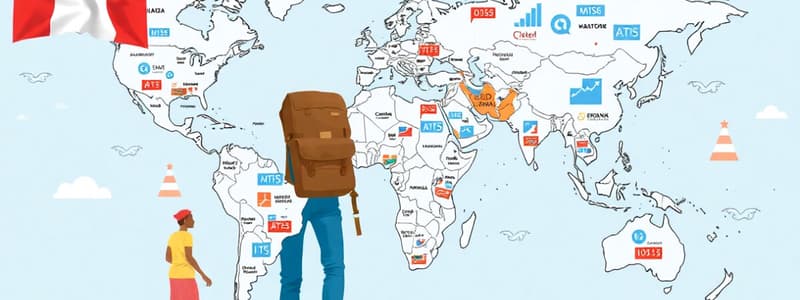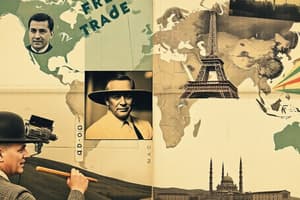Podcast
Questions and Answers
What does the global economy refer to?
What does the global economy refer to?
The interconnected worldwide economic activities that take place between multiple countries.
Which method allows countries to exchange goods and services effectively?
Which method allows countries to exchange goods and services effectively?
- Outsourcing
- Taxation
- Protectionism
- Free trade (correct)
Increased migration of the labor force benefits only the recipient countries.
Increased migration of the labor force benefits only the recipient countries.
False (B)
Free trade allows countries to specialize in the production of goods in which they have a __________ advantage.
Free trade allows countries to specialize in the production of goods in which they have a __________ advantage.
What are some key factors affecting the global economy?
What are some key factors affecting the global economy?
What is protectionism?
What is protectionism?
The agreement between governments to reduce or eliminate trade barriers is known as a __________ bloc.
The agreement between governments to reduce or eliminate trade barriers is known as a __________ bloc.
Flashcards are hidden until you start studying
Study Notes
Global Economy
- The global economy is the interconnected network of economic activities that take place across multiple countries.
- Global economic activities can have positive or negative impacts on countries.
- Countries can be viewed as separate units within the global economy, each with its own industrial production, labor market, financial market, resources, and environment.
Free Trade
- Free trade allows for the exchange of goods and services between countries.
- Countries can specialize in producing goods where they have a comparative advantage.
Movement of Labour
- International migration of workers can benefit both the receiving country and the workers themselves.
- Countries experiencing high unemployment can offer job opportunities for workers from other countries.
- This can help reduce geographical inequality.
Increased Economies of Scale
- Specialization in goods production leads to lower average costs and lower prices for consumers.
Increased Investment
- The global economy facilitates the attraction of short-term and long-term investments.
- Investments in developing countries can aid in improving their economies.
Factors Affecting the Global Economy
- Natural resources
- Infrastructure
- Population
- Labour
- Human capital
- Technology
- Law
Types of Economies
-
Protectionism
- Protecting a country's economy from foreign competition by establishing trade barriers.
- Example: North Korea
-
Trade Liberalization
- Reducing trade barriers to ease international trade.
- Example: Canada-Korea Free Trade Agreement, where Canada eliminated 97.8% of tariffs for goods from South Korea, and South Korea eliminated 98.2% of tariffs for goods from Canada.
- Example: NAFTA (North American Free Trade Agreement).
Outsourcing
- Outsourcing is the transfer of manufacturing from developed nations to developing nations to reduce production costs.
Studying That Suits You
Use AI to generate personalized quizzes and flashcards to suit your learning preferences.




